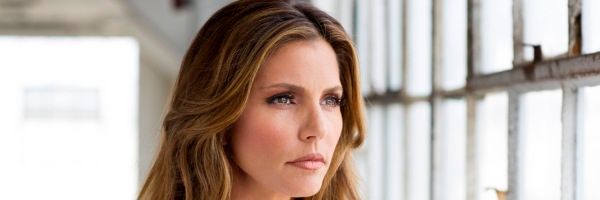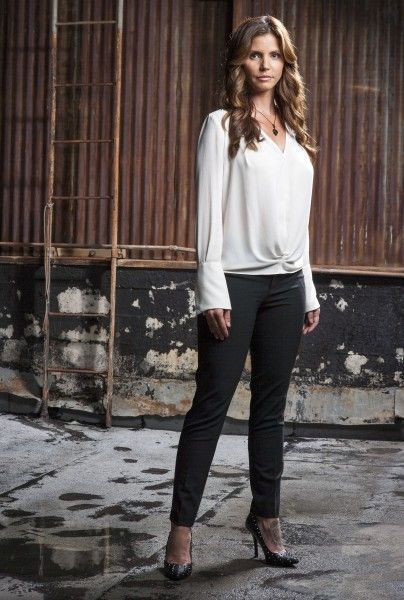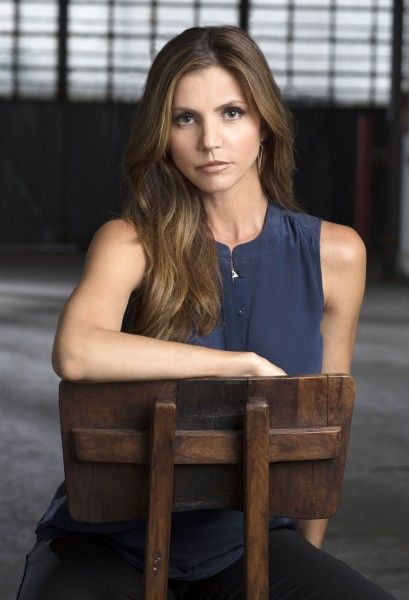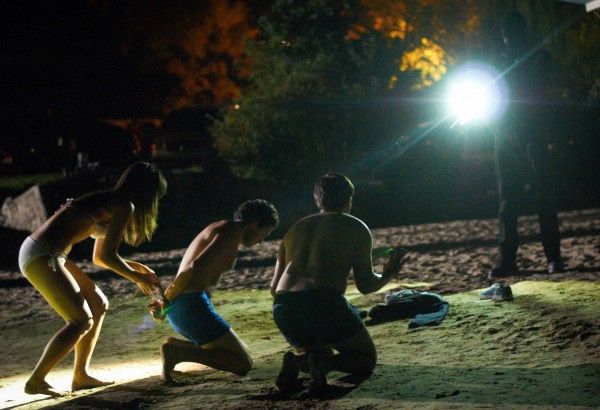The new Investigation Discovery series Surviving Evil presents stories of victims who fought back against their attackers and, against all odds, survived. Recounted in each survivor’s own words, the series is an empowering and inspiring look at true-crime stories, in which the victim turns the table on their assailant in order to stay alive. Series host and actress Charisma Carpenter (best known for her role as Cordelia Chase on Buffy the Vampire Slayer and its spin-off Angel) kicks off the 10 episodes by providing viewers with a chilling first-person, point-of-view story, as the survivor of a near-fatal incident that she endured when she was 22 years old.
During this recent exclusive interview with Collider, Charisma Carpenter talked about how this series came about, why now was the right time to tell her story, reliving her fight for survival (she was held at gunpoint, and her two friends were both shot and seriously wounded by the attacker, who turned out to be a police officer), how connected she feels to the other women who are also sharing their stories, always trusting your gut and intuition, and how she found the strength to move on. She also talked about being drawn to strong and sassy characters, throughout her career, and what an honor it is for her to have been a part of Buffy the Vampire Slayer. Check out what she had to say after the jump.
Collider: How did this show come about? Had you been looking to share your story, in some way?
CHARISMA CARPENTER: I don’t think I’ve ever really pursued telling my story, but I think things come to you at the right time. I was finally, after all these years, open to saying yes to telling my story. But, it took a lot of years. It happened a long, long time ago. I think it was just the right people involved, the right network involved, the right storytellers, and a willingness, on my end, to be open and honest about what happened to me. And I’m a mom, too. I think my perspective has changed because of that. I just think it was the right time.
Did it take any convincing, at all?
CARPENTER: The only convincing that I needed to talk about it was just about how it was going to be told. I really wanted a say in that final product. How would it be put together? What would the re-enactments look like? Would it be documentary style, or would it be sensationalized? I was very concerned about how it was going to be told, not so much that it would or wouldn’t. I wasn’t laboring over that. It was just how that I labored over.
Was it important to you that this show be called Surviving Evil, so that people immediately know that these are stories of how these women, and yourself, made it through?
CARPENTER: You know by the title that it all ends well. The message isn’t to terrify. It is suspenseful, in the way that we tell it and we draw it out, but ultimately you do know that there is a happy ending. Hopefully, the object is to inspire and to educate others.
Was it difficult to watch your episode, once it was all put together, especially with the re-enactments?
CARPENTER: Not for me, personally. I think the hardest part, for me, in all of this – in shooting it and in talking about it – was seeing Arthur again and learning how his life has unfolded since the incident happened, and being sad about that. He’s had hard times, and Aldo has had hard times. I don’t mean monetarily. I mean in spirit. That’s been hard because I see my friends coping with something where it’s not right that that happened. Also, I get emotional thinking about their pain, and how incredibly brave they were, especially Arthur jumping Hubbard. That was an incredibly brave thing to do, and it makes me emotional. He was a real-life hero. That makes me emotional.
In stopping this guy from hurting anyone else, could you appreciate what heroes you were, in that moment?
CARPENTER: No. I don’t think that you can know those things, in the moment. Like with most things, you’re in the moment, so you’re not thinking about it. You’re not in your head. There is no perspective because it’s right here, right now. Later, yes, that comes. And the gravity of his actions, in jumping Hubbard, stopping him and preventing him from harming me, and taking it a step further, knowing that he stopped him from hurting anyone else, is pretty compelling, brave, heroic, admirable and inspiring. He fought back. It was like he went, “I’m not a victim. I’m a survivor, and I’m gonna fight back. And not only am I gonna fight back, I’m gonna take you down. This is not gonna happen.” But having gone through what I went through, there is a self-knowledge that I have now. Unfortunately, it had to happen this way. The knowledge came at a price, but I find it very comforting. I can keep my head together in a crisis. I was able to think very clearly, strategize and go for help. I don’t know if it’s a good thing, but I didn’t comply with what he was saying because I knew that, if I did comply, I would be even more vulnerable and I wasn’t willing to be vulnerable. I wasn’t willing to be a victim. I only wanted to survive, and I only wanted to get through it.
Has it been cathartic for you to narrate these other women’s stories and hear what they went through?
CARPENTER: I felt very connected to Teri Jendusa Nicolai’s story about getting bludgeoned by her ex-husband, and Lisa McVey’s story about wanting to commit suicide the night that she was kidnapped by a serial rapist and killer. Their stories were very, very compelling. I felt, right off the bat, like I needed to meet these women. And then, I met them and I’m even more impressed. They’re stories on paper, but then when you meet them, they are not broken women. Teri is so soft, easy to laugh, super-genuine, good-hearted, and not bitter or hardened. She advocates for other women. She doesn’t dwell on what happened to her, or how her ex-husband is evil. And Lisa is a police officer today. She has a daughter that just graduated with a Master’s degree and just had a baby. These are powerful people. These are the kind of people I want to surround myself with. I’m inspired by them. There is a bond that I felt with them, immediately, and not because I’m a survivor too, but because I was inspired. I wanted to bond with them.
You state in your episode that you had a feeling that something was wrong, but you kind of brushed it off.
CARPENTER: I had some very strong instincts and intuition that danger was around me and it was threatening me, in a very real way.
Do you always trust your instincts now?
CARPENTER: Oh, absolutely! And that would be my message to other women. Always trust your gut and your intuition will steer you right, every time.
Obviously, when you go through an experience like this, it deeply affects you. How were you able to find the strength to move on with your life, and find a balance with career, motherhood and charity work?
CARPENTER: When I was eight years old, or I may have been younger, my aunt picked me up and threw me in the pool and I didn’t know how to swim. It was like, “Conquer your fear and just get on with it.” It must have made an impact on me because I’m mentioning it now. It’s what came to me, in this very moment, so I can’t deny that it made an impression on me. And I think that’s my motto. Sink or swim. Am I gonna drown in my sorrow? No. I have to overcome whatever obstacle it is. I’ve faced other obstacles in my life besides Hubbard. He’s not the penultimate obstacle in my life. My career is an ongoing thing. My love relationships are an ongoing thing. We’re constantly evolving. I have insecurities about being a good mom, or balancing my career with motherhood. All of those are very strong, very real obstacles. My motto is just unconsciously, and maybe now consciously because I’m saying it, is sink or swim. I’m a fighter.
You’ve played a lot of really strong, sassy women in your acting career. Is that something that was intentional, or did you even realize that?
CARPENTER: No, I think it might just be really good casting, in the sense that they saw something in me that I didn’t see or know was there. But, it was never a conscious choice to pick strong women, empowered women, entitled women and sassy women. It just worked out that way. Casting must see that and perpetuate it, so it just keeps coming my way. But, I can’t say that I’m upset about it. It’s very positive. Whether my character is sexual or she is a higher being, or whatever, she owns it.
Is there something specific that makes you accept or turn down a role, or do you just rely on instinct?
CARPENTER: I think I’m definitely attracted to the stronger types, or the smarter characters, or the professionals. I did a sitcom, years ago, where I played a lawyer and her love life was a disaster, but her professional life was well on track. I think those are interesting parts to portray because I identify with it and because it lends itself to saying that people are complex. We can all have it put together on paper, and we can all look good in our portfolios and on our resumes, but we don’t always have it all figured out. Striking that balance is difficult. I think that level of complexity makes for good comedy and good drama. There’s that constant conflict of balance. I think we’re all searching for those answers. It’s a universal theme. We don’t have it all figured out. Life is interesting. It’s a big ride.
Actors rarely have projects that sustain, over the years. With Buffy the Vampire Slayer, even all these years later, you’re still going to conventions and having cast reunions. What’s it like to have a project like that, in your career history?
CARPENTER: It’s unbelievable to have that level of support. It has not aired [new episodes] in 10 years. It is the best feeling and the most rewarding thing, any actor could ever hope to have. It’s a legacy, that show. And it was such an honor to have been a part of it. It’s huge! I got to be one of the lucky ones to be a part of it. I just feel so lucky. I’m still trying to live up to that and find that show that has that quality of writing, producing and all of that about it. It was a very ahead of its time show.
Surviving Evil airs on Wednesday nights on Investigation Discovery. You can learn more about the show at www.investigation.discovery.com/tv-shows/surviving-evil, where you’ll also find tips on self-defense.




